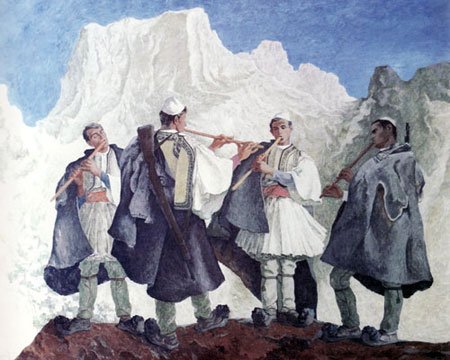
The Songs of the Frontier Warriors (Këngë Kreshnikësh) are the best-known cycle of northern Albanian epic verse. Still sung by elderly men playing the one-stringed “lahuta,” these epic rhapsodies are the literary reflections of legends portraying and glorifying the heroic feats of warriors of the past. The main cycle, that of “Mujo and Halili,” preserves much of the flavour of other heroic cultures such as those mirrored in Homer’s Iliad in Greek, Beowulf in English, El Cid in Spanish, the Chanson de Roland in French, the Nibelungenlied in German and the Russian Byliny. The leaders of this band of thirty “agas” or warriors are Gjeto Basho Mujo and his brother Halili, who inhabit a frontier region between the Ottoman Empire and Austria-Hungary. The Albanian songs of Mujo and Halili parallel the Bosnian versions of the cycle sung in Serbo-Croatian, or more properly, Bosnian. This heroic and epic verse occurs in both oral literatures and cultures, since the singers in southern Bosnia, the Sandjak, and Montenegro at the time were to a good extent bilingual, i.e. reciting alternatively in Bosnian and Albanian.
While the Bosnian Slav epic seems to have died out as a living tradition, the Albanian epic is still very much alive. Even as the twenty-first century marches on, one can still find a good number of “lahutars” in Kosova, in particular in the Rugova highlands west of Peja, and in northern Albania, as well as some rare souls in Montenegro, who are able to sing and recite the heroic deeds of Mujo and Halili and their thirty “agas,” as part of an unbroken oral tradition. One can safely assume that these elderly men constitute the very last traditional native singers of epic verse in Europe.
The Source of Mujo’s Strength
Young Mujo is sent to work as a cowherd in the high mountain pastures. There in the night, he comes across two infants in cradles. He rocks the cradles to comfort the children. Two zanas appear before him and grant him a wish for having cared for the infants. Mujo wishes for strength to overcome the other cowherds who tease him. The zanas give Mujo milk from their breasts until he is strong enough to raise a heavy boulder to his shoulders. Mujo then returns home to teach the other cowherds a lesson.
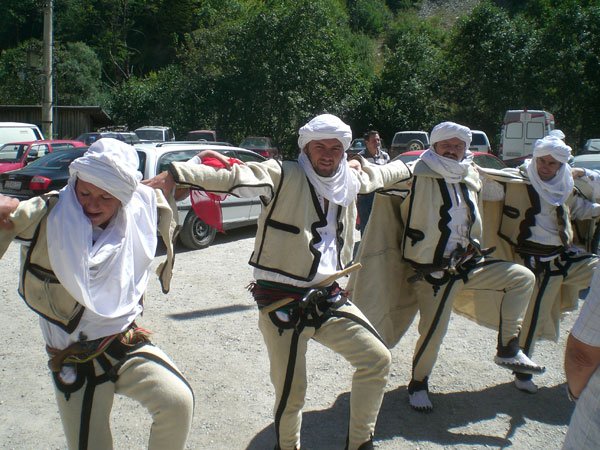
| Blessed we are, thanks to the Almighty! |
The Marriage of Gjeto Basho Mujo
Mujo sends wedding attendants to the Realm of the Christians to pick up his bride, warning them not to stop and make merry on the high mountain pastures, these being the home of the zanas. On their return journey, the attendants do stop and make merry, and are turned to stone by the zanas, who kidnap and enslave the bride. Mujo manages to find the bride at a fountain and tells her to ask the zanas about the source of their power. The zanas reveal to the bride that their power lies in three wild he-goats in the Green Valleys. Mujo and his hunters capture the animals. When the zanas arrive in Jutbina to beg for the return of their goats, they not only give back the wedding attendants, but also promise to serve Mujo in the future whenever he should be in need.
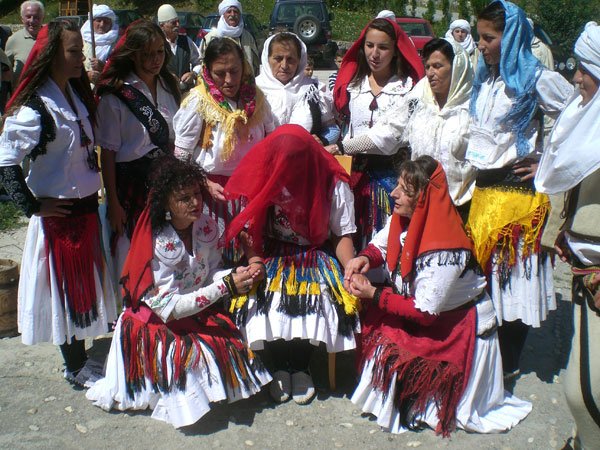
| Blessed we are, thanks to the Almighty! |
[Sung by Mëhill Prêka of Curraj i Epërm (District of Tropoja). Published in: Hylli i Dritës, Shkodra, 1924, p. 414 sq.; Visaret e Kombit, vol. II. ed. Bernardin Palaj and Donat Kurti (Tirana 1937), p. 1-10, and Folklor shqiptar II, Epika legjendare (Cikli i kreshnikëve), Vellimi i parë. ed. Qemal Haxhihasani (Tirana 1966), p. 51-59. Translated from the Albanian by Robert Elsie and Janice Mathie-Heck, and first published in English in Songs of the Frontier Warriors (Këngë Kreshnikësh): Albanian Epic Verse in a Bilingual English-Albanian Edition (Wauconda, Illinois: Bolchazy-Carducci Publishers, 2004).]
Mujo’s Oras
The Slavic warrior Paji Harambashi sets out to do battle with Mujo. Searching for him in the mountains, he comes across three white oras who present themselves as Mujo’s protectors. In his fury, Paji mishandles the oras, who later go and ask Mujo to avenge the deed. Mujo sets off, refusing the request of his young brother Halili to accompany him. Halili is insulted and departs on his courser to see his blood brother in the Realm of the Christians. An ora appears and tells Halili how to overcome Paji. Using magic herbs, he gets into Paji’s mansion, where he captures the warrior’s father and the fair maid Januka. Paji returns home with Mujo and the thirty Agas as his prisoners. Halili lays in waiting and slays him. When he leaves the mansion, Halili sees his brother and the thirty Agas in chains, and triumphs in the knowledge that he has saved them. All return victoriously to Jutbina.
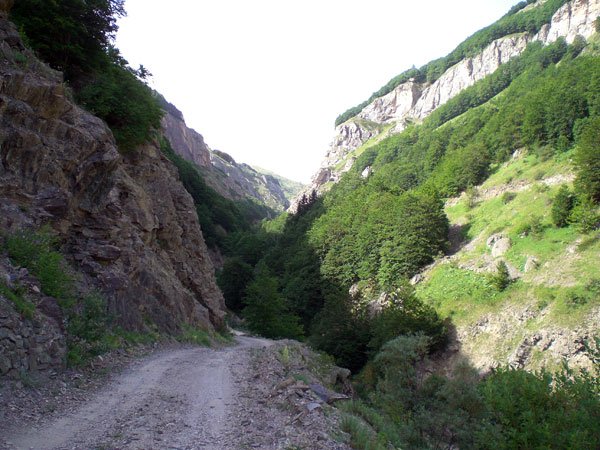
| Blessed we are, thanks to the Almighty! |
[Sung by Lulash Zefi of Curraj i Epërm (District of Tropoja). Published in: Visaret e Kombit, vol. II. ed. Bernardin Palaj and Donat Kurti (Tirana 1937), p. 11-19; and Folklor shqiptar II, Epika legjendare (Cikli i kreshnikëve), Vellimi i parë. ed. Qemal Haxhihasani (Tirana 1966), p. 60-67. Translated from the Albanian by Robert Elsie and Janice Mathie-Heck, and first published in English in Songs of the Frontier Warriors (Këngë Kreshnikësh): Albanian Epic Verse in a Bilingual English-Albanian Edition (Wauconda, Illinois: Bolchazy-Carducci Publishers, 2004).]
Mujo Visits the Sultan
Mujo and Halili receive a letter from the Sultan, summoning them to the court in Istanbul. They fear they are to be executed, but their mother persuades them to obey. When Mujo arrives in Istanbul, the staircase and the doorway of the palace are too small for him and must be rebuilt to let him pass through. Mujo has an audience with the Sultan, who is simply curious to meet the hero in person. When Mujo takes his leave, a hook on his trousers snags on the imperial throne and he drags the Sultan himself across the hall to the doorway.
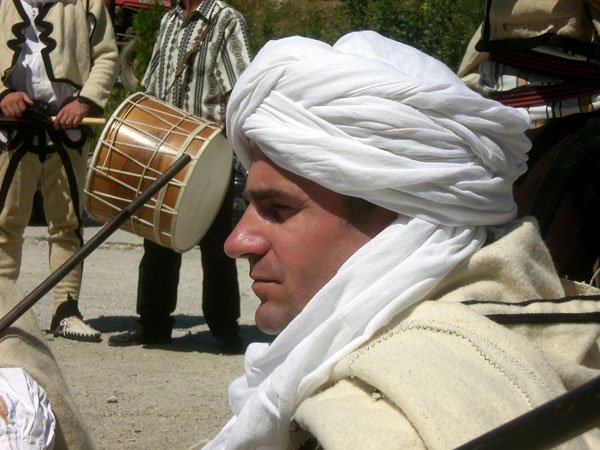
| Such brave young men were Mujo and Halili, |
[Recorded in Kosova. Published in: Visaret e Kombit, vol. II. ed. Bernardin Palaj and Donat Kurti (Tirana 1937), p. 20-22; and Folklor shqiptar II, Epika legjendare (Cikli i kreshnikëve), Vellimi i parë. ed. Qemal Haxhihasani (Tirana 1966), p. 68-70. Translated from the Albanian by Robert Elsie and Janice Mathie-Heck, and first published in English in Songs of the Frontier Warriors (Këngë Kreshnikësh): Albanian Epic Verse in a Bilingual English-Albanian Edition (Wauconda, Illinois: Bolchazy-Carducci Publishers, 2004).]
The Marriage of Halili
The Agas ask Mujo why his brother Halili is not married. Halili protests that he will have no one but Tanusha, the daughter of the king of the Christians, whom he met during a truce. When the snows melt, Halili sets off for the Realm of the Christians. On his journey, a mountain ora shows him some tents at a riverbank. Halili steals into one of the tents and encounters Tanusha. In order to escape with him, Tanusha dresses Halili up as a maiden. The king and his cortege then set out for New Kotor, taking Tanusha and the disguised Halili with them. In the meantime, the queen has had a nightmare of a black wolf among the sheep and insists on going to visit her daughter, now in a fortress by the seaside. Halili is discovered and captured and Tanusha is thrown out onto the streets. With the help of Jovan, however, she manages to send Mujo a message. Mujo and the Agas arrive in New Kotor and save young Halili from the stake.
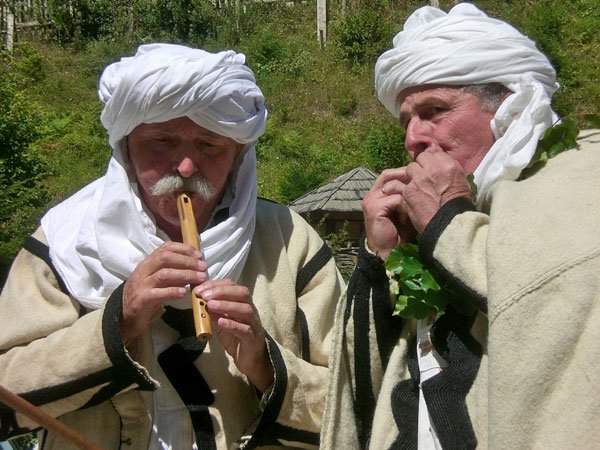
| May you be blessed, oh our God Almighty! |
[Sung by Mëhill Prêka of Curraj i Epërm (District of Tropoja). Published in: Visaret e Kombit, vol. II. ed. Bernardin Palaj and Donat Kurti (Tirana 1937), p. 23-41; and Folklor shqiptar II, Epika legjendare (Cikli i kreshnikëve), Vellimi i parë. ed. Qemal Haxhihasani (Tirana 1966), p. 71-86. Translated from the Albanian by Robert Elsie and Janice Mathie-Heck, and first published in English in Songs of the Frontier Warriors (Këngë Kreshnikësh): Albanian Epic Verse in a Bilingual English-Albanian Edition (Wauconda, Illinois: Bolchazy-Carducci Publishers, 2004).]
Gjergj Elez Alia
The hero Gjergj Elez Alia has been on his deathbed for nine years, tended by his faithful sister. A baloz emerges from the ocean, demanding tribute, including Gjergj’s sister. Gjergj awakes from his slumber, sends his sister to have the warhorse shod and challenges the baloz to a duel. Gjergj slays the baloz with his cudgel and saves the country. Brother and sister then die in each other’s arms and are buried in a common grave under a linden.
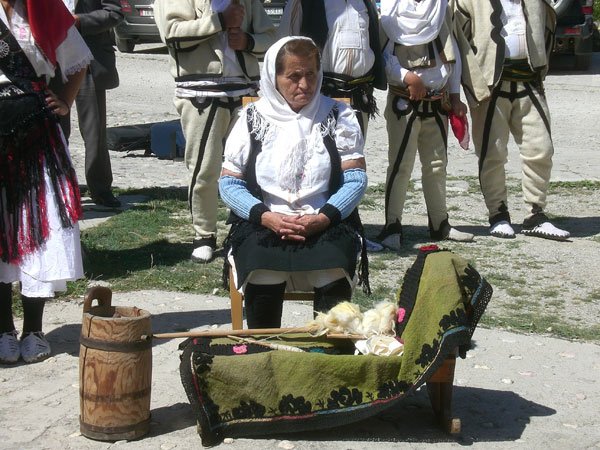
| Gjergj Elez Alia, the greatest of heroes, |
[Recorded in Nikaj (District of Tropoja). Published in: Visaret e Kombit, vol. II. ed. Bernardin Palaj and Donat Kurti (Tirana 1937), p. 42-48; and Folklor shqiptar II, Epika legjendare (Cikli i kreshnikëve), Vellimi i parë. ed. Qemal Haxhihasani (Tirana 1966), p. 87-91. Translated from the Albanian by Robert Elsie and Janice Mathie-Heck, and first published in English in Songs of the Frontier Warriors (Këngë Kreshnikësh): Albanian Epic Verse in a Bilingual English-Albanian Edition (Wauconda, Illinois: Bolchazy-Carducci Publishers, 2004).]
Mujo and Behuri
Mujo summons his thirty Agas to assemble for a raid in the mountains. Halili and his bosom friend, the young Zuku Bajraktari, hold vigil all night while the Agas sleep. The next day, a dispute arises among the Agas and the çeta is divided into two groups. Halili is separated forever from his beloved Zuku Bajraktari. Up in the high pastures, Mujo catches sight of the daughters of the Slavic warrior Behuri, guarded by thirty pandours. He and his warriors ambush the pandours and seize the maidens. Later, Mujo, in search of a forgotten lance, meets an ora who tells him he must slay Behuri. Mujo secretly enters Behuri’s mansion, there to find the severed heads of the other half of the çeta. Setting a wick to the sacks of gunpowder, he blows the mansion up. Mujo and Behuri duel in the mountain pastures. With the intervention of an ora, Mujo slays his rival. All return home to Jutbina and celebrate a wedding.
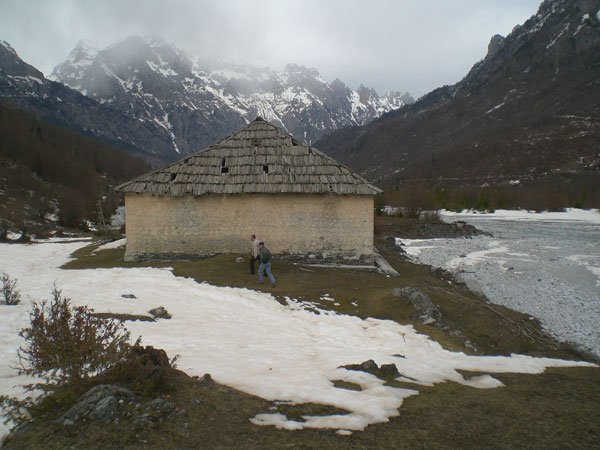
| May you be blessed, oh our God Almighty! |
[Sung by Lulash Zefi of Curraj i Epërm (District of Tropoja). Published in: Hylli i Dritës, Shkodra, 1924, p. 257 sq.; Visaret e Kombit, vol. II. ed. Bernardin Palaj and Donat Kurti (Tirana 1937), p. 49-62; and Folklor shqiptar II, Epika legjendare (Cikli i kreshnikëve), Vellimi i parë. ed. Qemal Haxhihasani (Tirana 1966), p. 92-103. Translated from the Albanian by Robert Elsie and Janice Mathie-Heck, and first published in English in Songs of the Frontier Warriors (Këngë Kreshnikësh): Albanian Epic Verse in a Bilingual English-Albanian Edition (Wauconda, Illinois: Bolchazy-Carducci Publishers, 2004).]
Mujo’s Courser
A splendid foal is born to Mujo’s mare. The Captain King is jealous and offers a reward for its capture. Arnaut Osmani betrays Mujo for the money, and the courser is spirited off to the Kingdom of the Christians. In his search for the courser, Mujo comes upon the Slavic shepherd Raspodini, whom he slays. Dressed up in the shepherd’s clothes, he receives the king’s permission to train the wild courser. Thus Mujo manages to steal his horse back. On his way home, he reflects on the injustice of the theft he has committed and returns the courser to the king. The king then commands the shepherd to escort his daughter to her wedding. During the journey, Mujo removes his disguise, captures the three hundred other escorts and the king’s daughter, and takes them back to Jutbina. The king, waiting alone in his palace, receives a letter from Mujo, and resigns himself to having a new son-in-law.
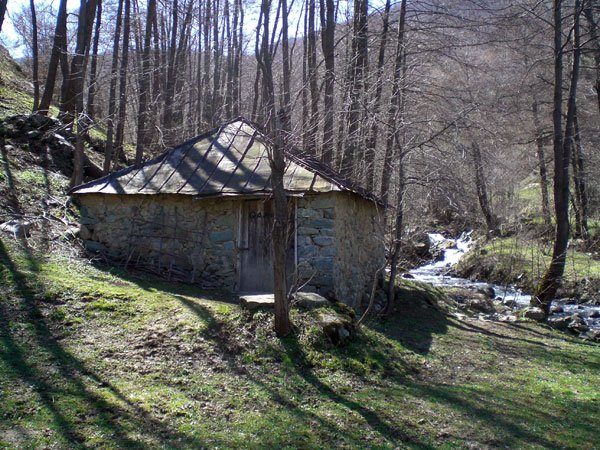
| Night was passing, moon not risen, |
[Recorded in Shala (District of Shkodra). Published in: Visaret e Kombit, vol. II. ed. Bernardin Palaj and Donat Kurti (Tirana 1937), p. 70-80; and Folklor shqiptar II, Epika legjendare (Cikli i kreshnikëve), Vellimi i parë. ed. Qemal Haxhihasani (Tirana 1966), p. 109-118. Translated from the Albanian by Robert Elsie and Janice Mathie-Heck, and first published in English in Songs of the Frontier Warriors (Këngë Kreshnikësh): Albanian Epic Verse in a Bilingual English-Albanian Edition (Wauconda, Illinois: Bolchazy-Carducci Publishers, 2004).]
Young Omeri
A baloz challenges an old man to a duel. He has no sons, so his daughter offers to fight on his behalf. Dressed as a boy on her way to the war grounds, she visits the home of Ali, to whom she is betrothed. Ali is agitated at the beauty of the boy and asks his mother for advice. The mother suspects that the visitor, calling himself young Omeri, is indeed a girl and has her son test him with musical instruments and games. But the girl does not betray her true gender, even when they spend the night together. The love-struck Ali proposes to make young Omeri his blood brother. The girl refuses, saying she must fight a baloz first, but will then return. The girl slays the baloz and returns to her father. Time then comes for her to marry and she is escorted to her husband’s home. Ali is distraught that his blood brother has not returned. The bride appears at the door and explains to him that she is young Omeri, and everyone rejoices.
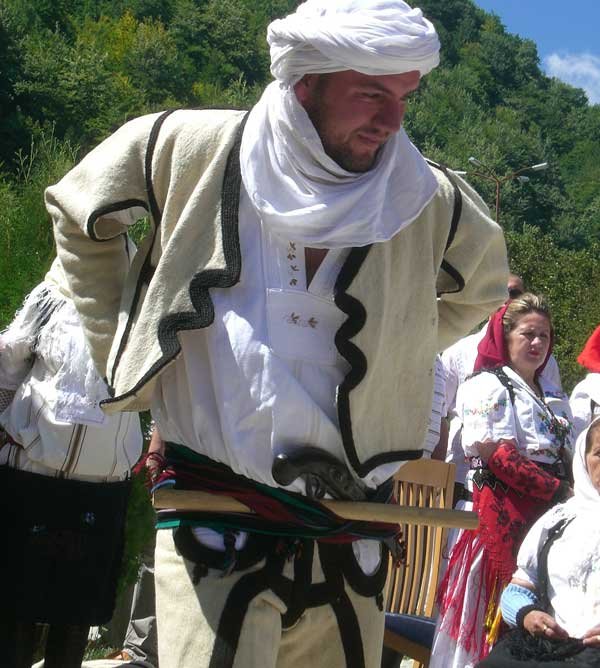
| Blessed we are, thanks to the Almighty! |
[Sung by Mirash Ndou of Shosh (District of Shkodra). Published in: Visaret e Kombit, vol. II. ed. Bernardin Palaj and Donat Kurti (Tirana 1937), p. 81-88; and Folklor shqiptar II, Epika legjendare (Cikli i kreshnikëve), Vellimi i parë. ed. Qemal Haxhihasani (Tirana 1966), p. 119-125. Translated from the Albanian by Robert Elsie and Janice Mathie-Heck, and first published in English in Songs of the Frontier Warriors (Këngë Kreshnikësh): Albanian Epic Verse in a Bilingual English-Albanian Edition (Wauconda, Illinois: Bolchazy-Carducci Publishers, 2004).]
Zuku Bajraktar
Zuku Bajraktar captures the Slavic warrior Baloz Sedelija and takes him home as his prisoner. His mother secretly falls in love with the baloz and offers to free him. The baloz is afraid of Zuku’s strength, so the mother offers to blind her son. The mother taunts Zuku, telling him his father was stronger and could burst ten ropes tied around him. Zuku lets himself be bound and is thus captured by the mother, who blinds both him and his courser. Wandering aimlessly in the mountains, the blind Zuku is met by an ora who restores his sight with some herbs and tells him to take vengeance. A friend of Zuku’s advises him to dress as a beggar and steal his way into his mother’s home. At midnight, Zuku slays the baloz and reveals himself to the horrified mother. In the forest, Zuku ties the mother to a beech tree, covers her in pitch and burns her to death. “May God give no one such a mother.”
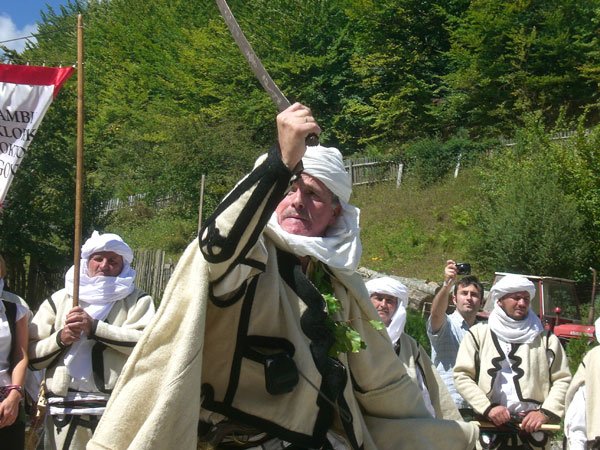
| When Zuku Bajraktar was living, |
[Recorded in Shala (District of Shkodra). Published in: Visaret e Kombit, vol. II. ed. Bernardin Palaj and Donat Kurti (Tirana 1937), p. 89-96; and Folklor shqiptar II, Epika legjendare (Cikli i kreshnikëve), Vellimi i parë. ed. Qemal Haxhihasani (Tirana 1966), p. 126-132. Translated from the Albanian by Robert Elsie and Janice Mathie-Heck, and first published in English in Songs of the Frontier Warriors (Këngë Kreshnikësh): Albanian Epic Verse in a Bilingual English-Albanian Edition (Wauconda, Illinois: Bolchazy-Carducci Publishers, 2004).]
Arnaut Osmani and Hyso Radoica
The Slavic warrior Hyso Radoica is determined to have Arnaut Osmani’s wife for his bride. In the spring, he steals over the mountains to Jutbina and captures her at the fountain. Arnaut Osmani sends the king a message written in blood, demanding that he order Hyso to the war grounds for a duel. The two men fight savagely until they can no longer see anything through all the blood. During a pause, they begin talking and discover that they are brothers, separated in early years during a raid on their native town of Zahara. Hyso proposes that they ride to Zahara in search of their mother. The long-suffering mother, seeing her two grown-up sons before her, dies from the shock and is buried. The two men and the bride then return to Jutbina to celebrate their reunion.
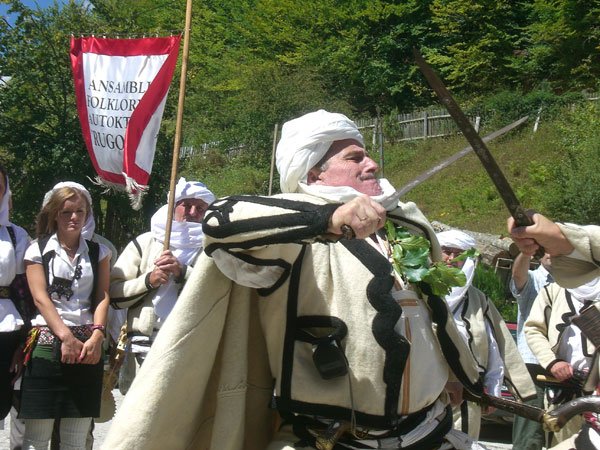
| Thirty captains were assembled, |
[Sung by Palë Buli of Selca (District of Malësia e Madhe). Published in: Visaret e Kombit, vol. II. ed. Bernardin Palaj and Donat Kurti (Tirana 1937), p. 97-107; and Folklor shqiptar II, Epika legjendare (Cikli i kreshnikëve), Vellimi i parë. ed. Qemal Haxhihasani (Tirana 1966), p. 133-141. Translated from the Albanian by Robert Elsie and Janice Mathie-Heck, and first published in English in Songs of the Frontier Warriors (Këngë Kreshnikësh): Albanian Epic Verse in a Bilingual English-Albanian Edition (Wauconda, Illinois: Bolchazy-Carducci Publishers, 2004).]
Ali Bajraktari or the Word of Honour
Ali Bajraktari is caught by the king’s Hungarian guards and is put into prison. In order to get his hands on Ali’s bride, the king sends back a double, but the plot fails when the bride recognizes that the man is not her husband. The king then writes her, telling her that Ali will remain in prison forever. She resolves to wait for him for three years before remarrying. Three years pass and Ali receives word that his wife is about to marry Halili. He begs the king for six days’ leave from prison, giving his word of honour that he will return. The king’s daughter offers to stand bail for Ali if he should not come back. Ali returns home looking like a poor beggar. His wife, living with Mujo and Halili, recognizes a mark on his forehead and the two escape through a trap door. Mujo follows them, but since Ali had only taken what rightly belonged to him, they make peace and hold a six-day celebration. On the sixth day, Ali announces that he must go back to prison and sets off for the Kingdom. The king, seeing that Ali has kept his promise, then gives him his freedom to return home.
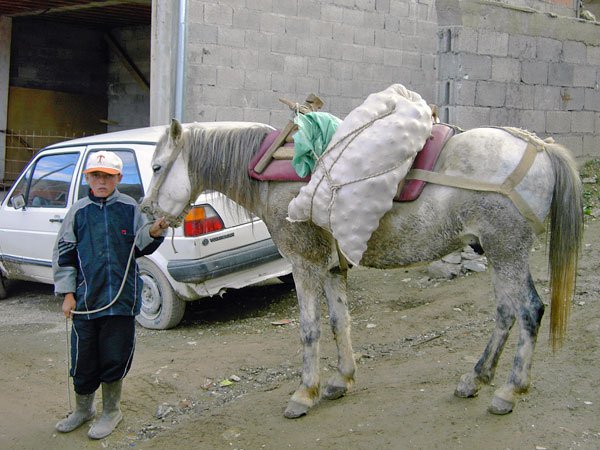
| Once there was a widowed mother |
[Sung by Palok Ujka of Kastrat (District of Malësia e Madhe). Published in: Visaret e Kombit, vol. II. ed. Bernardin Palaj and Donat Kurti (Tirana 1937), p. 108-117; and Folklor shqiptar II, Epika legjendare (Cikli i kreshnikëve), Vellimi i parë. ed. Qemal Haxhihasani (Tirana 1966), p. 142-149. Translated from the Albanian by Robert Elsie and Janice Mathie-Heck, and first published in English in Songs of the Frontier Warriors (Këngë Kreshnikësh): Albanian Epic Verse in a Bilingual English-Albanian Edition (Wauconda, Illinois: Bolchazy-Carducci Publishers, 2004).]
Arnaut Osmani
Having been sentenced with his companions to years in prison, Arnaut Osmani devises a plan. He pretends to have died in his cell. His companions scream and wail in lamentation. Awakened by the noise, the king sends his daughter down to the dungeon. She sees the dead Arnaut, who had been her lover, and begs her father to bury him. The king is suspicious and first subjects the body to all sorts of tests and tortures. Arnaut resists unmoved, but manages to let the daughter know he is alive. At her insistence, the king finally removes his shackles. Arnaut jumps up, seizes a sword and slays the king and his entourage. Then he frees his companions and they all set off for Jutbina, taking the king’s daughter and thirty other maidens with them.
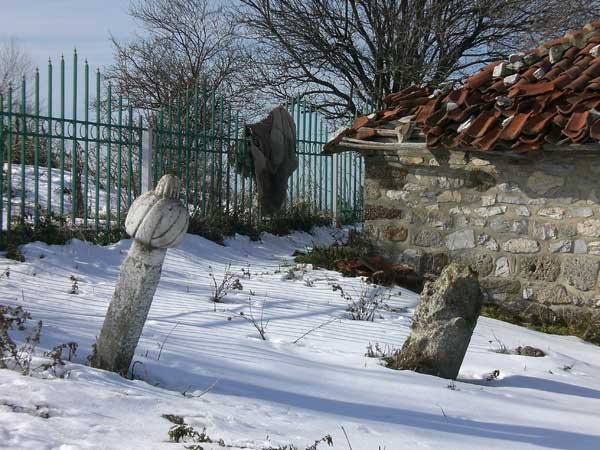
| May you be blessed, oh God Almighty! |
[Recorded in Shala (District of Shkodra). Published in: Visaret e Kombit, vol. II. ed. Bernardin Palaj and Donat Kurti (Tirana 1937), p. 130-135; and Folklor shqiptar II, Epika legjendare (Cikli i kreshnikëve), Vellimi i parë. ed. Qemal Haxhihasani (Tirana 1966), p. 161-165. Translated from the Albanian by Robert Elsie and Janice Mathie-Heck, and first published in English in Songs of the Frontier Warriors (Këngë Kreshnikësh): Albanian Epic Verse in a Bilingual English-Albanian Edition (Wauconda, Illinois: Bolchazy-Carducci Publishers, 2004).]
Zuku Captures Rusha
Provoked by Mujo, Zuku Bajraktari declares he will go and capture the king’s daughter Rusha. He first asks his mother for advice. She fears for his life, but gives him a strong courser for the journey. When Zuku reaches Rusha’s kulla, he calls out to her. She is afraid and asks him to show her his sleeve and the ring she had given him before she opens the door. The next evening, the two return to Jutbina. Mujo sends Zuku a message, saying that Rusha belongs to him. After much dispute over the maiden, the two warriors go to the cadi, whom both threaten to kill if they do not win the case. The cadi decides that the matter must be settled on the war grounds. The first on horseback to reach Rusha will have her. Mujo is faster but, through divine intervention, his horse shies away at the last moment. Zuku thus wins his Rusha.
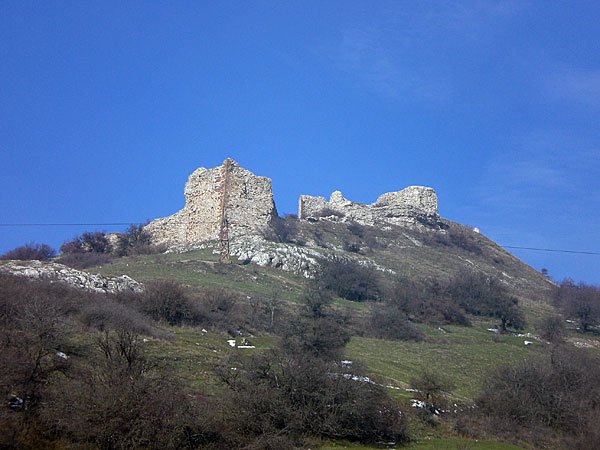
| Thirty Agas were assembled, |
[Sung by Dedë Zefi of Curraj i Epërm (District of Tropoja). Published in: Visaret e Kombit, vol. II. ed. Bernardin Palaj and Donat Kurti (Tirana 1937), p. 140-145; and Folklor shqiptar II, Epika legjendare (Cikli i kreshnikëve), Vellimi i parë. ed. Qemal Haxhihasani (Tirana 1966), p. 169-174. Translated from the Albanian by Robert Elsie and Janice Mathie-Heck, and first published in English in Songs of the Frontier Warriors (Këngë Kreshnikësh): Albanian Epic Verse in a Bilingual English-Albanian Edition (Wauconda, Illinois: Bolchazy-Carducci Publishers, 2004).]
Mujo’s Wife is Kidnapped
The Captain King boasts of his wealth and possessions, but his wife tells him he is nothing compared to Mujo. The king then trains three hundred roughnecks and with them, he burns down Mujo’s kulla, captures his wife, the Turkish Mehreme, and seizes all of his possessions. Returning home, he marries Mujo’s wife and makes a servant of the first wife, who had offended him. The Agas offer to build Mujo a new kulla, but for him it is a matter of honour. He sets off for the Kingdom, but is betrayed there by Mehreme, who gets him drunk and ties him up. The king grants Mujo one last request before execution – time to play his lahuta. The mountain zanas hear his song and inform Halili. Halili sets off for the Kingdom, slays the king and frees his brother. Mujo slays the wife who betrayed him and returns to Jutbina.
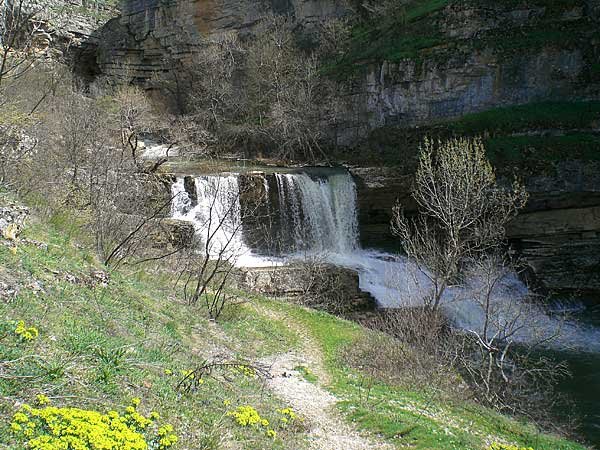
| We worship you, oh God Almighty! |
[Sung by Mëhill Prêka of Curraj i Epërm (District of Tropoja). Published in: Hylli i dritës, Shkodra, 7 (1931), p. 621-634; Visaret e Kombit, vol. II. ed. Bernardin Palaj and Donat Kurti (Tirana 1937), p. 159-169; and Folklor shqiptar II, Epika legjendare (Cikli i kreshnikëve), Vellimi i parë. ed. Qemal Haxhihasani (Tirana 1966), p. 188-198. Translated from the Albanian by Robert Elsie and Janice Mathie-Heck, and first published in English in Songs of the Frontier Warriors (Këngë Kreshnikësh): Albanian Epic Verse in a Bilingual English-Albanian Edition (Wauconda, Illinois: Bolchazy-Carducci Publishers, 2004).]
Mujo and Jevrenija
The maidens of the Kingdom are talking about their boyfriends. The king’s daughter Jevrenija is silent at first, but finally speaks of her love for Sokol Halili. Her mother is horrified that she is in love with a Muslim and demands that the king execute her in order to preserve his honour. As punishment, the king decides instead to give his daughter in two weeks’ time to the black gumans. Jevrenija writes a letter in blood to Mujo. Mujo and the Agas of Jutbina resolve to dress up as gumans and save the maiden before the real gumans arrive. When they arrive, the king puts them to the test, forcing them to say mass and to slice a candle in twain without making it flicker, something which only real gumans can do. They succeed and set off home with the maiden. Only when it is too late does the king realize that he has been deceived.
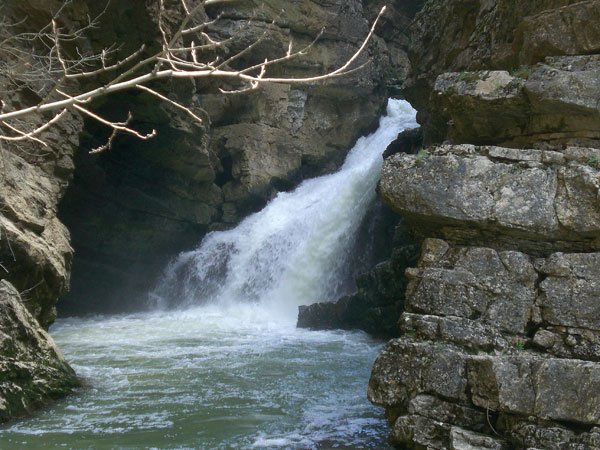
| We worship you, oh God Almighty! |
[Sung by Dedë Zefi of Curraj i Epërm (District of Tropoja). Published in: Visaret e Kombit, vol. II. ed. Bernardin Palaj and Donat Kurti (Tirana 1937), p. 170-174; and Folklor shqiptar II, Epika legjendare (Cikli i kreshnikëve), Vellimi i parë. ed. Qemal Haxhihasani (Tirana 1966), p. 199-202. Translated from the Albanian by Robert Elsie and Janice Mathie-Heck, and first published in English in Songs of the Frontier Warriors (Këngë Kreshnikësh): Albanian Epic Verse in a Bilingual English-Albanian Edition (Wauconda, Illinois: Bolchazy-Carducci Publishers, 2004).]
Halili Avenges Mujo
The Agas in the mountains send Dizdar Osman Aga to fetch Mujo, their leader. Mujo has been ambushed by King Llabutani and lies in bed gravely wounded, attended by an ora, a serpent and a wolf. Dizdar is horrified at the wounds he sees on Mujo’s body. Mujo sends young Halili to replace him, but the Agas make fun of the lad. In his fury, Halili sets off by himself for the Kingdom to avenge the attack on his brother. There he captures Rusha, the king’s daughter, and spirits her off to a cave in the mountains. The king and his shkja warriors besiege the cave. Halili slays the king with his cudgel, but is encircled. The zanas, seeing Halili’s plight, hasten to Mujo, bind his wounds and restore his health with herbs. Mujo comes to Halili’s rescue and the shkjas take flight. It is only when Mujo tells him, that young Halili realizes he has slain the great Llabutani.
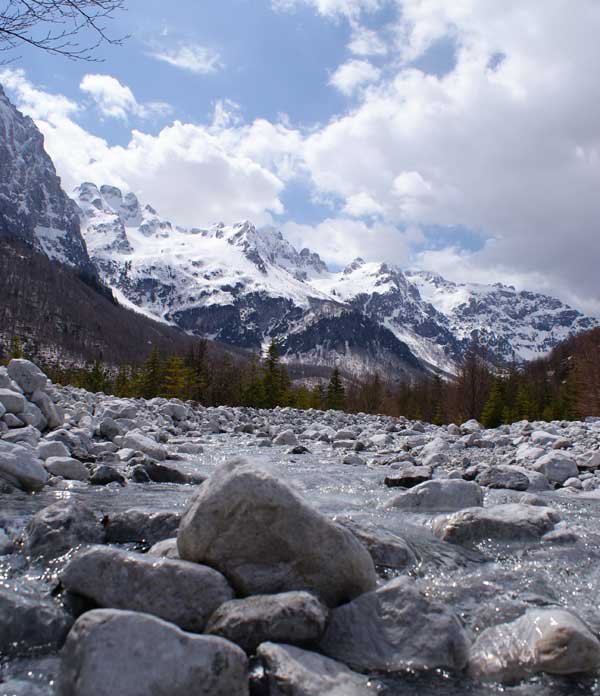
| Blessed we are, thanks to the Almighty! |
[Sung by Tomë Sokoli of Dushman (District of Shkodra). Published in: Visaret e Kombit, vol. II. ed. Bernardin Palaj and Donat Kurti (Tirana 1937), p. 175-185; 203-212. Translated from the Albanian by Robert Elsie and Janice Mathie-Heck, and first published in English in Songs of the Frontier Warriors (Këngë Kreshnikësh): Albanian Epic Verse in a Bilingual English-Albanian Edition (Wauconda, Illinois: Bolchazy-Carducci Publishers, 2004).]
Omer, Son of Mujo
Young Omer is destined for heroic deeds. Fearing for his safety, his mother tells him that his father and uncle are dead, but the Agas reveal to him that the two have been held prisoner by the king for seven years. Omer dresses up as a Christian and rides over to the Kingdom. At a fountain, while playing his sharki, he meets the king’s daughter Rusha, who is in love with him. In accordance with a plot she devises for him, Omer kidnaps the king’s twin sons and holds them for ransom. The king accedes, releasing Mujo and Halili and complying with all of Mujo’s demands. On his return, Mujo pretends to want to slay the twins in order to test Omer’s reaction. Omer opposes Mujo, as the twins are under his protection, and from this reaction Mujo knows Omer is indeed his son. The twins are returned to the king, and father and son celebrate their reunion.
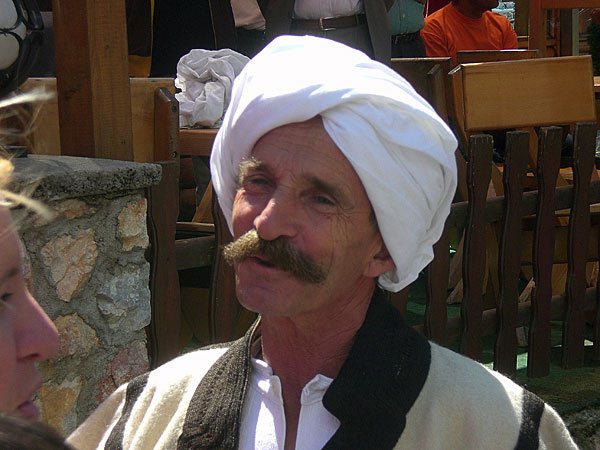
| It’s you we worship, God Almighty! |
[Sung by Mëhill Prêka of Curraj i Epërm (District of Tropoja). Published in: Hylli i dritës, Shkodra, 7 (1931), p. 685-693; Visaret e Kombit, vol. II. ed. Bernardin Palaj and Donat Kurti (Tirana 1937), p. 203-210; and Folklor shqiptar II, Epika legjendare (Cikli i kreshnikëve), Vellimi i parë. ed. Qemal Haxhihasani (Tirana 1966), p. 229-235. Translated from the Albanian by Robert Elsie and Janice Mathie-Heck, and first published in English in Songs of the Frontier Warriors (Këngë Kreshnikësh): Albanian Epic Verse in a Bilingual English-Albanian Edition (Wauconda, Illinois: Bolchazy-Carducci Publishers, 2004).]
The Death of Omer
Despite his wife’s protests, Mujo takes his son, young Omer, to the mountains with him to learn the art of war. He sends the boy over to the Kingdom of the Christians to attack a church. Omer holes up in the building, shoots the priest and is then besieged by shkja warriors, who shoot him nine times. Mujo and Halili, hearing his groan from afar, come to his rescue. They carry the lad up to the high mountain pastures. There the boy dies, asking his father not to tell his mother of his death because she would suffer. They dig a grave and bury Omer there. On his return home, Mujo is obliged to reveal to his wife that this, her eighth son, has also been killed and lies buried in the mountains.
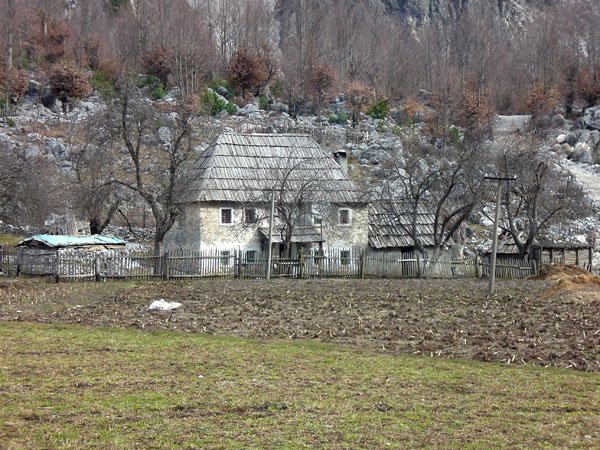
| To his wife spoke Mujo, saying: |
[Sung by Lulash Zefi of Curraj i Epërm (District of Tropoja). Published in: Visaret e Kombit, vol. II. ed. Bernardin Palaj and Donat Kurti (Tirana 1937), p. 218-223; and Folklor shqiptar II, Epika legjendare (Cikli i kreshnikëve), Vellimi i parë. ed. Qemal Haxhihasani (Tirana 1966), p. 242-246. Translated from the Albanian by Robert Elsie and Janice Mathie-Heck, and first published in English in Songs of the Frontier Warriors (Këngë Kreshnikësh): Albanian Epic Verse in a Bilingual English-Albanian Edition (Wauconda, Illinois: Bolchazy-Carducci Publishers, 2004).]
Ajkuna Mourns Omer
Mujo tells his wife Ajkuna that their son Omer has been slain and lies buried in the mountains. Ajkuna begins wailing and Mujo expels her harshly from the house. Ajkuna drags herself up to the Green Valleys to visit her son’s grave. There she mourns him, wishing to be buried with him and begging him to come out of his dark grave. The mountain oras take pity on her, calm her down, dry her tears and return her to Jutbina.
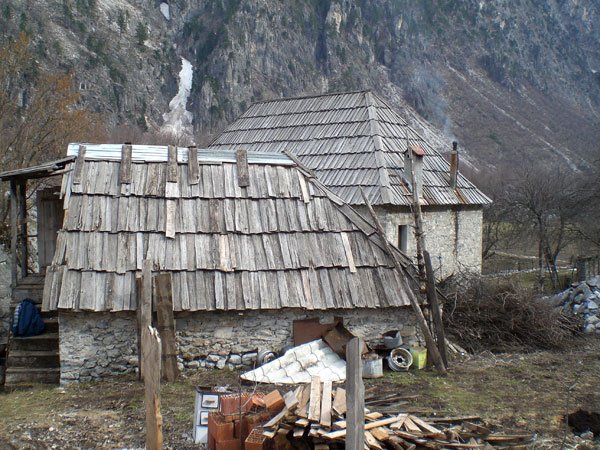
| We worship you, oh God Almighty! |
[Sung by Mirash Gjoni of Curraj i Epërm (District of Tropoja). Published in: Visaret e Kombit, vol. II. ed. Bernardin Palaj and Donat Kurti (Tirana 1937), p. 224-226; and Folklor shqiptar II, Epika legjendare (Cikli i kreshnikëve), Vellimi i parë. ed. Qemal Haxhihasani (Tirana 1966), p. 247-249. Translated from the Albanian by Robert Elsie and Janice Mathie-Heck, and first published in English in Songs of the Frontier Warriors (Këngë Kreshnikësh): Albanian Epic Verse in a Bilingual English-Albanian Edition (Wauconda, Illinois: Bolchazy-Carducci Publishers, 2004).]
The Death of Halili
Arnaut Osmani deceives Halili by telling him that the shkjas have murdered Mujo. Halili sets off to take revenge and kills three hundred shkja warriors before he himself is slain by Zadrani of Tetova. When Mujo returns from the mountain and learns that his brother is off fighting, he follows him and comes across Halili’s corpse. He pursues Zadrani, and the two warriors struggle with one another for three days of hand-to-hand combat. When he is about to be defeated, Mujo cries in Turkish to the zanas, who tell him of a poison dagger in his pocket. With the dagger, Mujo manages at last to slay Zadrani.
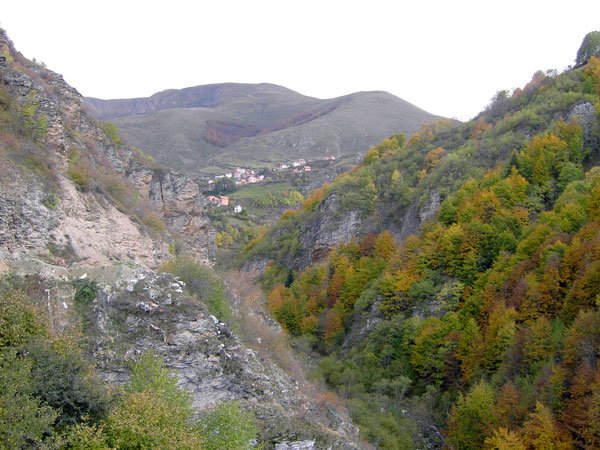
| Gathered Agas of Jutbina |
[Sung by Shan Zefi of Curraj i Epërm (District of Tropoja). Published in: Visaret e Kombit, vol. II. ed. Bernardin Palaj and Donat Kurti (Tirana 1937), p. 227-230; and Folklor shqiptar II, Epika legjendare (Cikli i kreshnikëve), Vellimi i parë. ed. Qemal Haxhihasani (Tirana 1966), p. 250-252. Translated from the Albanian by Robert Elsie and Janice Mathie-Heck, and first published in English in Songs of the Frontier Warriors (Këngë Kreshnikësh): Albanian Epic Verse in a Bilingual English-Albanian Edition (Wauconda, Illinois: Bolchazy-Carducci Publishers, 2004).]
Mujo Wounded
Provoked by Arnaut Osmani, Mujo goes out duelling on an unlucky day and is shot nine times. The dying Mujo makes one last request of Arnaut, who refuses it and insults and taunts the dying hero. Mujo dies. The zanas are disturbed by the loud neighing of his grieving horse. They decide to revive Mujo, breathe life into him and get him back on his horse. Mujo returns home to learn that a son has been born to him, and slays Arnaut Osmani for his treachery.
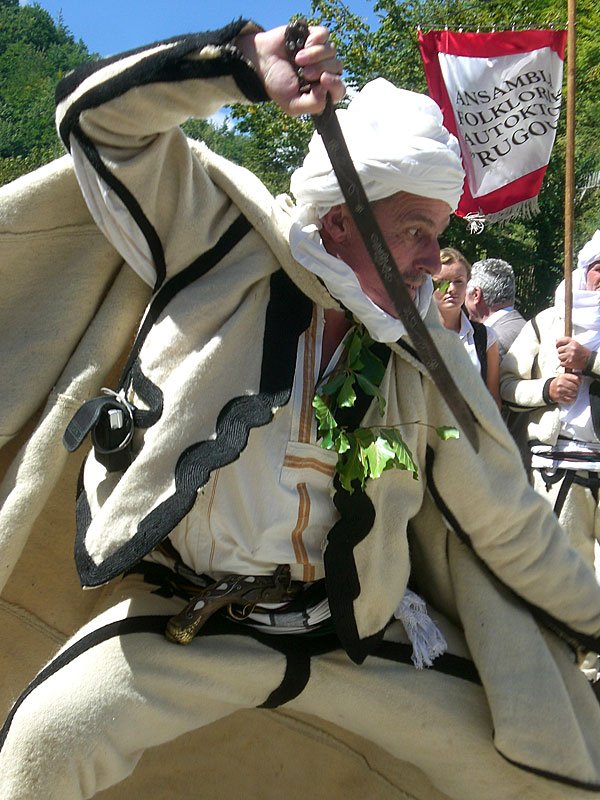
| Thirty Agas met in Jutbina, |
[Sung by Dedë Zefi of Curraj i Epërm (District of Tropoja). Published in: Visaret e Kombit, vol. II. ed. Bernardin Palaj and Donat Kurti (Tirana 1937), p. 231-233; and Folklor shqiptar II, Epika legjendare (Cikli i kreshnikëve), Vellimi i parë. ed. Qemal Haxhihasani (Tirana 1966), p. 253-254. Translated from the Albanian by Robert Elsie and Janice Mathie-Heck, and first published in English in Songs of the Frontier Warriors (Këngë Kreshnikësh): Albanian Epic Verse in a Bilingual English-Albanian Edition (Wauconda, Illinois: Bolchazy-Carducci Publishers, 2004).]
After Mujo’s Death
Mujo is stricken by pain in the mountains. Before dying, he tells Halili not to reveal to anyone that he has perished. Otherwise the shkjas would invade and take over the country. A sea baloz, however, informs the Slavic king of Mujo’s death and goes in search of the hero’s grave. Finding it, the baloz tears out the stake and pounds the grave with it. Taunted by the baloz, Mujo endeavours to rise from the grave but is impeded by the boards of the coffin. A bird informs Halili of the events. He sets off on his courser, slays the baloz and unearths Mujo, whom the zanas have brought back to life. The two heroes return safely to Jutbina to continue their lives of daring-do.
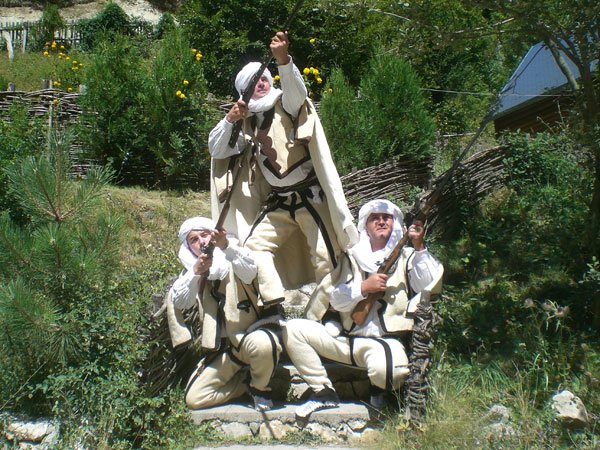
| The heroes Mujo and Halili |
[Sung by Dedë Zefi of Curraj i Epërm (District of Tropoja). Published in: Visaret e Kombit, vol. II. ed. Bernardin Palaj and Donat Kurti (Tirana 1937), p. 234-236; and Folklor shqiptar II, Epika legjendare (Cikli i kreshnikëve), Vellimi i parë. ed. Qemal Haxhihasani (Tirana 1966), p. 255-256. Translated from the Albanian by Robert Elsie and Janice Mathie-Heck, and first published in English in Songs of the Frontier Warriors (Këngë Kreshnikësh): Albanian Epic Verse in a Bilingual English-Albanian Edition (Wauconda, Illinois: Bolchazy-Carducci Publishers, 2004).]